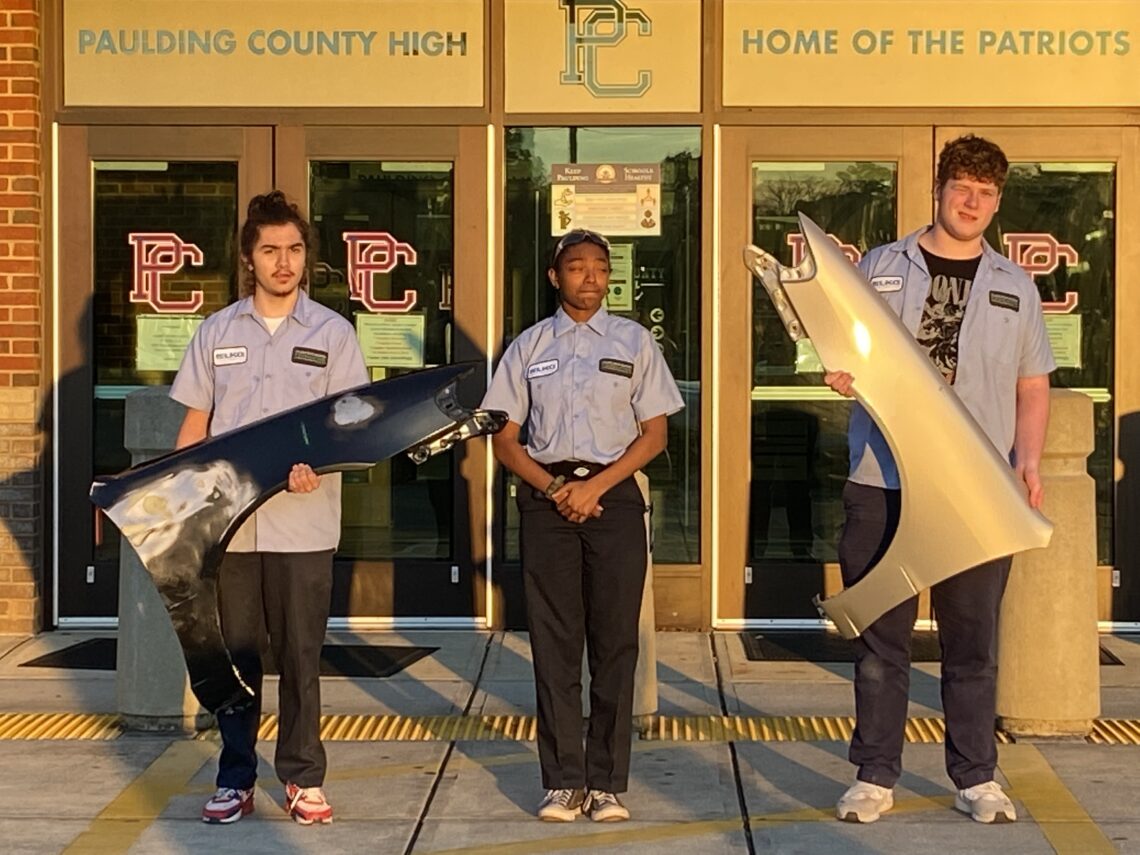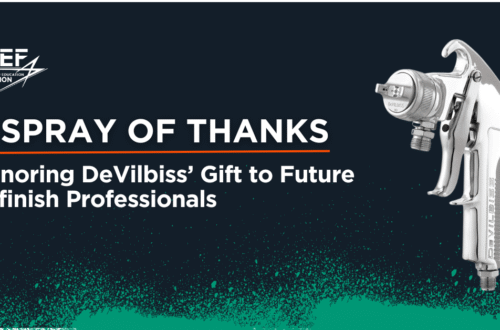
Grants, Golf and Gratitude: Atlanta I-CAR Committee Strengthens Local Schools’ Collision Programs Through CREF
Created for the Collision Repair Education Foundation
“Dear Advisory Board: Thank you for your support and letting me learn how to repair body work on a car. Without your help, and Mr. Goodwin’s teaching, I probably wouldn’t have learned what I learned this semester.”
“Thank you for donating tools to help us learn about a new career that can help us later in life.”
“You guys have done so much for our class. We can’t thank you enough!”
Collision repair students at Paulding County High School (PCHS) in Dallas, GA sent handwritten notes to members of their program’s advisory board after the school’s second annual Small Car Race, an end-of-year project where students race the six-inch-long small cars they’ve built using recycled car parts.
“By building these cars, the students learn skills like design, sanding, metal work, welding, and painting, but in addition to allowing them to develop basic skills, this project helps build their self-confidence,” shares Melissa Dunn, chair of the PCHS advisory board and co-chair of training for the Atlanta I-CAR Committee. “Students were so proud of the cars they built, and many asked for advice on how they could have improved the design and paint after the races. Returning students will take what they learned this year – and the feedback received – to build a better car for next year’s race.”
Dunn estimates that around 100 people stopped by to watch the races, including Hayden Swank, a late model race car driver with NASCAR aspirations. “Students were excited to see Hayden – and they definitely felt the pressure to do well in front of a real race car driver,” Dunn notes. “Hayden was wonderful to come to the event and support the school’s program…he even waved the green flag to start cars down the track!”
Last year’s Small Car Race generated enough attention to inspire several students to transfer into the auto body program for the 2021-2022 school year, which is only the second year for the collision repair program at PCHS. Instructor Leroy Goodwin taught automotive for six years, but he felt that he was doing students a disservice by not offering any auto body experience. “Two years ago, this program didn’t exist, but when the school agreed to let me add it, I started with nothing more than my personal tools and built it up from nothing,” he recalls.
But the program is growing strong. Two students competed in their state’s SkillsUSA competition this spring with Goodwin’s advanced student taking third place in collision repair and his first-year student placing fourth in refinishing. “His blending was dead-on; the judge couldn’t even find the blend lines,” Goodwin brags. “I was so proud of them both. We also had our first collision graduate recently. He finished school with an ASE certification…and a job offer. We’ll have at least 20 students graduating next year.”
So, how did Goodwin manage to establish and develop such a strong auto body program in a short amount of time…and on the school’s limited program budget of $5,000?
“Without the support we’ve received from our advisory board, the Atlanta I-CAR Committee and the Collision Repair Education Foundation (CREF), there’s no way this program would be anywhere near where it’s at,” he expresses. “Our advisory board members are committed to our program and constantly make sure we have everything we need. The Atlanta I-CAR Committee has funded grants and donated tools, equipment and computers, while CREF has also given us tools, estimating software, paint and many materials. These groups are our backbone, and we wouldn’t have this program if it wasn’t for their aid.”
“Because PCHS applies for the CREF grant, they are also able to take advantage of funds raised by the Atlanta I-CAR Committee, allowing Mr. Goodwin to purchase more equipment for his classroom and teach his students the basic skills needed to start their career in the collision repair industry,” Dunn offers. “We are always looking to recruit students that have passion for their craft and want to continue learning; we need them now more than ever, and if we can pique their interest earlier, we improve our chances of seeing them complete their training and enter the workforce after graduation. Without CREF’s grants, many schools cannot afford the equipment and supplies needed to teach their students each year.”
PCHS received a $10,000 CREF Benchmark Grant in 2021, funded by the Atlanta I-CAR Committee’s Annual Golf Tournament. Over the years, the committee has raised over $700,000 for area schools, but their recent iteration generated the most funds to-date. The committee’s efforts raised over $100,000 to support local collision repair education programs through CREF.
“This was our biggest event ever!” Atlanta I-CAR Committee Chair Gerry Poirier divulges. “We sold out with 214 golfers, thanks to high involvement from all segments of the industry and the wonderful job our golf committee does. We have a great team in a great industry, and I’m lucky to lead this group.”
Collision repair professionals from all over the country flocked to the Atlanta I-CAR Committee’s 12th Annual Golf Tournament on April 20 for a beautiful sunny day on the green. While the helicopter ball drop is always a crowd favorite, with this year’s winner receiving $2,000, raffle ticket sales offered multiple opportunities for participants to win fun prizes. For Poirier, the highlight of the event was visiting with the four local schools in attendance, which provided evidence of the impact the committee is making. “This was the first time that four schools showed up to thank everyone for participating in the golf tournament and helping raise funds that support their programs.”
Maxwell High School Instructor Sam Melaragno felt it was important to attend the golf tournament to express his appreciation for everything the Atlanta I-CAR Committee and CREF do to help him and his students since 2012. “They’ve blessed us tremendously. Between the grants, tools and equipment, I never need – or even want for – anything. Whenever I need supplies, they show up for us, enabling me to focus on teaching my kids what they need to know to get started in a shop…they make my job easy.
“These guys really care about the industry, and they work tirelessly to get things done,” Melaragno adds. “Our advisory board is also great. They’re involved and eager to support our program, and they provide input on our curriculum to help us understand how we can get our students ready for them to hire. Their input is as valuable as the support they give us financially.”
“When we support a school, we don’t just hand them money and walk away; we get involved on their advisory boards and their activities because we want to help the programs and the students succeed,” Poirier agrees. “Raising a lot of money is great, but it’s more important that those funds being used to make a difference.”
Student engagement is the best way to gauge the impact of these efforts, and according to Melaragno, “When boxes filled with paint and supplies show up, the adult-sized high school kids get excited like it is Christmas morning. They can’t wait to see what’s inside, and they know that each delivery is just another way that the industry is investing in them and their futures. They notice how much these auto body professionals show up for them, and they recognize how much they’re needed in this industry.”
The Atlanta I-CAR Committee also wants to ensure that students are financially able to pursue their collision careers, so they recently awarded scholarships to two Maxwell High School students through CREF. Marinelly Santiago and Abale Haylay will each receive a $3,000 scholarship to use toward tuition, books and tools as they further their educational pursuits.
“This is an amazing industry, but we have to attract more young people,” Poirier insists. “Learning to fix cars can open so many doors to a great career, so we do what we can to get good people interested, educated and employed. CREF is doing a great job raising awareness with efforts like Operative Talent, but they can’t do it without our help. Industry professionals need to support CREF because you’re busy and can’t do it all – and that’s exactly why you need to support the Foundation!
“CREF is the industry’s voice for attracting good talent,” he continues. “As a shop owner, you don’t have time to go to the American School Counselor Association Conference to improve the industry’s image. You don’t have the resources to coordinate career fairs around the country. And while you’re hopefully invested enough in our industry’s future to sit on a local school’s advisory board, the Foundation engages with hundreds of schools and thousands of students each year on a national level – for all of us! Supporting CREF and your local schools is a really important ways we can all make a difference in our industry’s future.”
Industry members interested in getting involved and supporting the Collision Repair Education Foundation’s efforts to assist secondary and post-secondary collision repair training programs should contact Brandon Eckenrode, Managing Director, at 312-231-0258 or Brandon.Eckenrode@ed-foundation.org. Monetary donations can be made online.
The Collision Repair Education Foundation, founded in 1991, is a not-for-profit organization dedicated to supporting collision repair educational programs, schools, and students to create qualified, entry-level employees and connect them with an array of career opportunities. For information on how to donate to programs supported by the Education Foundation, visit us online at: www.CollisionEducationFoundation.org.
Follow us on social media on Facebook, Instagram, LinkedIn, and YouTube.




